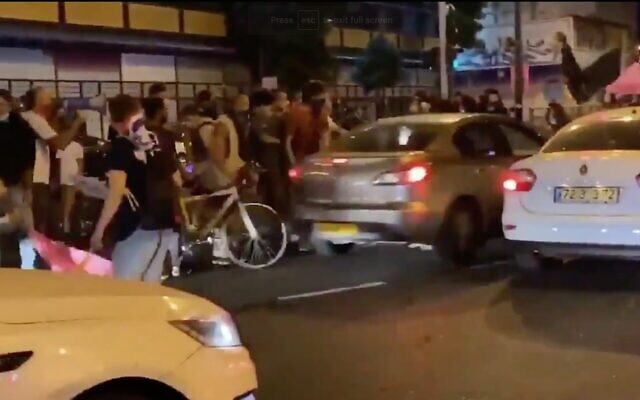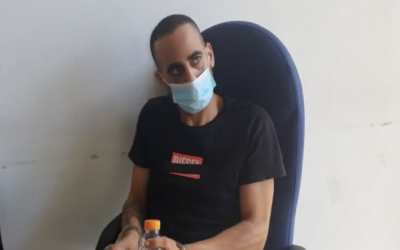Pini Luzon, who was filmed accelerating into protesters, claims he was trying to flee scene after feeling ‘surrounded and attacked’ in his car

A suspect was arrested Friday after an alleged car-ramming attack on protesters at an anti-government rally in Tel Aviv the night before.
The incident, caught on film, occurred as thousands took to the streets on Thursday to protest new coronavirus restrictions that limit the ongoing demonstrations over Prime Minister Benjamin Netanyahu’s indictment on graft charges and handling of the pandemic.
As some 3,000 demonstrators gathered in Habima Square, a car stopped and then accelerated into a group of protesters standing in the middle of a road near the protest site, before speeding away.

The driver, named as 35-year-old Pini Luzon, had been stopped at a nearby lockdown roadblock but was allowed to pass despite visible damage to his car. He was arrested in the early hours of Friday morning, police said.
At a hearing Friday, during which his remand was extended until Sunday, Luzon asserted he was trying to get away from the demonstrators, not attack them.
“I got stuck in the situation and got scared. I felt surrounded and attacked in my car, so I fled the scene,” he told the Tel Aviv Magistrate’s Court. “I was in a storm of emotions.”
Luzon claimed the incident was not politically motivated and he had no affinity for the prime minister, who the demonstrators were protesting against.
“I don’t even like Bibi and I don’t like politics,” he said, using Netanyahu’s nickname.
The police, meanwhile, called on witnesses to come forward with accounts of the incident, “so that the full picture can become clear.”
משטרת תל אביב מבצעת בשעה זו סריקות לאיתור הנהג שדרס את המפגינות. הוא ייעצר ברגע שיימצא. למי שלא בטוח שמדובר בניסיון דריסה, ראיתי בעיניי כיצד הוא מתעצבן שנאלץ להמתין שהצעידה תעבור, לוחץ על דוושת הגז ודוהר לכיוון המפגינים שבדרכו, לא מאט גם כשפוגע, ולאחר מכן טס ברמזור אדום ונמלט pic.twitter.com/XvLHFpbfzU
— עמרי מניב omri maniv (@omrimaniv) October 1, 2020
In the video of the incident shared on social media, a woman, later named as 51-year-old Dorit Zak, is seen falling to the ground before standing up again.
Speaking to Kan public radio, Zak said she and other protesters were not goading the drivers stuck in traffic.
“I wasn’t provoking anyone. I was just walking,” she said. “There were a lot of people there. Amid the people, there were two vehicles, the driver of one seemed impatient and from a complete standstill he hit the gas and started driving.”
“Suddenly, I had the front of a car in my stomach. I flew and fell on the road,” Zak said.
Other footage of the incident showed Zak walking towards paramedics and demanding that they take her to the hospital. Protestors also claimed two people suffered bruising, Channel 12 news reported.
הרוחות מתלהטות. המפגינים לא מפסיקים לצעוד pic.twitter.com/YEpbxnVVkz
— Bar Peleg (@bar_peleg) October 1, 2020
However, the Magen David Adom emergency service later said that after examining the people, none were found to be injured.
“An ambulance was standing a meter away from me and no one bothered to approach me. The demonstrators helped me. No policeman approached me — the police are not interested,” Zak claimed.
During the demonstrations, police also arrested 13 demonstrators for “disturbing public order” by blocking traffic and refusing to obey police commands to disperse.
“The police chief informed the protesters that this was an illegal demonstration and gave them a reasonable amount of time to disperse,” police said in a statement.
Dozens of fines were also handed out for “violating Health Ministry guidelines.”
Demonstrators were seen scuffling with police in Tel Aviv as officers worked to clear them from roads. Mounted police also arrived to control the crowds.
הערב מתחיל לצאת משליטה. המפגינים כלואים בין כוחות משטרה ברחוב לה גארדיה ומנסים לצאת לרחובות צדדיים. המשטרה מכניסה סוסים לתוך הקהל pic.twitter.com/pNiva4EZTE
— Bar Peleg (@bar_peleg) October 1, 2020
The Tel Aviv rallies were one of over 1,000 small, scattered demonstrations that erupted around the country on Thursday night as a Knesset committee gave the final approval needed for legislation restricting protests to within a kilometer of one’s home, and to groups of no more than 20 people.
Police have not specified whether they will continue to allow up to 2,000 demonstrators to gather in 100 socially distanced “clusters” of 20 people each outside the Prime Minister’s Residence on Balfour Street in Jerusalem. Tens of thousands of protesters have attended such previous protests, but these were being limited to 2,000 in recent days, and it is not clear whether that will still be the case now that the new restrictions have been approved.
While proponents of the restrictions say that they are intended to curb Israel’s coronavirus infections, organizers involved in the anti-Netanyahu protest movement of the past three months have vociferously opposed the new regulations, saying that they violate their freedom to protest.
As reported by The Times of Israel
